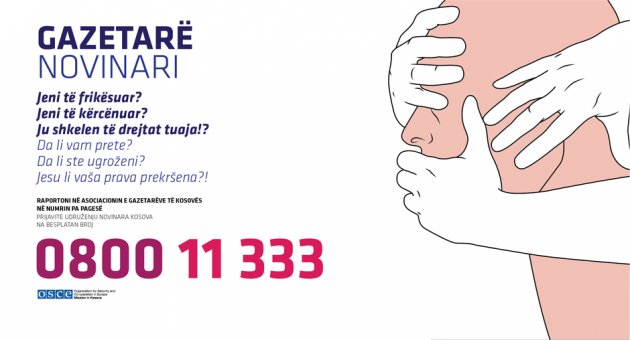Index relies entirely on the support of donors and readers to do its work.
Help us keep amplifying censored voices today.

Each week, Index on Censorship’s Mapping Media Freedom project verifies threats, violations and limitations faced by the media throughout the European Union and neighbouring countries. Here are five recent reports that give us cause for concern.
Sergey Leleka, a columnist for the pro-government newspaper Komsomolskaya Pravda, suggested in an article on 24 October that independent journalists Anton Nosik and Sergei Parkhomenko should be “cured in gas chambers”.
According to Leleka, he wrote the article in reaction to jokes by Nosik and Parkhomenko about the Russian aircraft carrier Admiral Kuznetsov which passed through the English Channel emitting thick black smoke.
After the journalists complained to KP, the media outlet deleted the offending paragraph. However, Leleka’s original post is still available on his Facebook page.
A number of Belgian media websites, including De Standaard, RTBF, Het Nieuwsblad, Gazet van Antwerpen and Het Belang van Limburg were subject to a co-ordinated DDoS attack on 24 October, which temporarily shut the sites down.
A group that calls itself the Syrian Cyber Army claimed responsibility.
“We have attacked the Belgian media outlets that support the terrible actions of their Air Force in Syria,” the group said in a message to the newspapers. It wanted to “shame the Belgian authorities, which killed dozens of civilians in the village of Hassajik near Aleppo on 18 October”.
Belgium’s Federal Prosecutor’s Office has launched an investigation.
Editor-in-chief of Gazeta Express, Leonard Kerquki, received death threats after the airing of his documentary which mentions war crimes committed by the Kosovo Liberation Army.
The documentary, Hunting the KLA, aired in two parts and covers crimes and prosecutions from the war between Serbia and Kosovo at the end of the 1990s. The threats were made after the showing of the second part on 23 October.
The Journalist Association of Kosovo condemned the threats, as did the OSCE mission in Kosovo. “I condemn the threats and calls for violence against Kërquki. Freedom of expression must be upheld and respected in all circumstances,” said the head of Kosovo’s OSCE mission, Jan Braathu. “I call on rule of law authorities to investigate these threats immediately and bring the perpetrators to justice,” he said.
Ella Taranova, a senior producer for Russia Today, was detained by Latvian border guards on 21 October and later deported.
The incident occurred after Taranova was admitted to Latvia and to participate in a conference in a seaside suburb of Jurmala.
Taranova was blacklisted for being an employee of Russia Today, which the Latvian authorities see as a hostile propaganda organ of the Russian government. The head of Russia Today, Dmitry Kiselyov, is blacklisted from travelling to the European Union and other countries under EU sanctions imposed in the wake of Russia’s annexation of Crimea.
After her detention, Taranova told journalists: “I did not engage in any political activities nor do I intend to.” She added that she was unaware that she had been blacklisted since 2014 and had attended several such conferences prior to 2014.
At around 6am on 21 October, Russian Investigative Committee (SKR) officers entered and searched the apartment of Ksenia Babich, journalist and spokesperson for human rights international organisation Russian Justice Initiative.
According to Shelepin, SKR officers confiscated a notebook, phones and memory cards.
Babich was also asked to go to the SKR for questioning, Ilia Shelepin, a journalist and Babich’s acquaintance, wrote on Facebook. Babich believes the search is related to the case of Artyom Skoropadski, a press secretary of the Ukrainian organisation Pravyi Sektorwhich, which is banned in Russia.
Mapping Media Freedom
|
 Each week, Index on Censorship’s Mapping Media Freedom project verifies threats, violations and limitations faced by the media throughout the European Union and neighbouring countries. Here are five recent reports that give us cause for concern.
Each week, Index on Censorship’s Mapping Media Freedom project verifies threats, violations and limitations faced by the media throughout the European Union and neighbouring countries. Here are five recent reports that give us cause for concern.
Dear @carlbildt – my flat was raided today – for journalism.
Arresteringsorder utfärdad mot SvD-skribent https://t.co/cttcywRsJN via @SvD— YavuzBaydar (@yavuzbaydar) August 30, 2016
30 August 2016 – The home of veteran journalist and Index contributor Yavuz Baydar was raided by the police, the journalist reported via Twitter.
The raid came shortly after detention warrants were issued for 35 people including 27 journalists. As of 30 August, of the 27 journalists sought nine have been detained in Turkey while 18 other journalists are reportedly abroad.
Also read by Baydar: Turkey: Losing the rule of law
28 August 2016 – At around 10pm an unidentified individual threw a hand grenade at the house of Mentor Shala, the director of Kosovo’s public broadcaster RTK.
Shala and his family were inside at the time. No casualties were reported but according to the RTK director the explosion was strong and that it had shocked the whole neighbourhood.
Kosovo’s police are investigating the case, which is the second attack on national broadcaster RTK within a week. On 22 August 2016 an explosive device was thrown at the broadcaster’s headquarters.
President Hashim Thaci has condemned the attack. “Criminal attacks against media executives and their families threaten the privacy and freedom of speech, and at the same time seriously damage the image of Kosovo,” he told RTK.
Both attacks were claimed by a group called Rugovasit, which said in a written statement to RTK that the attack was “only a warning”.
Rugovasit blames RTK journalist Mentor Shala for only reporting the government’s perspective. “If he does not resign from RTK, his life is in danger,” they said.
27 August 2016 – Journalist and founder of news agency Novy Region, Alexander Shchetinin, was found dead in his apartment in Kiev.
The National Police confirmed in a statement that “a man with a gunshot wound to the head was discovered on the balcony”. He reportedly died between 8-9.30pm.
Police found cartridges, a gun and a letter at the scene. “The doors to the apartment were closed, the interior looks intact,” police reported.
“Until all the facts are established, until the examination and forensic examination is complete, we are investigating it as a murder,” said Kiev police chief Andrey Kryschenko. “The main lines of enquiry are suicide and connections with his professional activities.”
The Russian-born journalist had lived in the Ukrainian capital since 2005. He was often critical of the Russian government. In 2014, he refused Russian citizenship, later joined the National Union of Journalists of Ukraine.
20 August 2016 – Faeces was poured onto the prominent Russian journalist Yulia Latynina, who works for independent newspaper Novaya Gazeta and hosts a programme called Kod Dostupa at radio station Echo of Moscow.
According to Latynina, the incident took place close to the radio’s office at Novy Arbat in central Moscow. An unidentified individual in a motorcycle helmet perpetrated the attack, while his accomplice was waiting for him at a motorcycle nearby. The unidentified individuals fled the scene.
Latynina told Echo of Moscow that it was the 14th or the 15th time she has been attacked. She believes the assailants had been following her for a long time as they seemed to know her daily commute and where she parks her car.
Latynina also believes the incident is connected to her Novaya Gazeta investigations into billionaire Evgeny Prigozhin, who is close to Russian President Vladimir Putin. According to Latynina’s investigations, Prigozhin has orchestrated mass trolling on opposition activists in Saint Petersburg.
22 August 2016 – A prosecutor has asked for a three-month prison sentence for Faig Amirli, the director of the newspaper Azadliq, Radio Free Europe’s Azerbaijan Service.
Amirli’s lawyer declared that his client is being charged for spreading national and religious hatred, along with promoting religious sects and disturbing public order by performing religious activities.
Amirli was detained by a group of unidentified individuals on 20 August. At the time, his whereabouts were unknown while his house was searched by the representatives of Grave Crimes Unit.
Police claim they found literature related to Fethullah Gülen, the alleged orchestrator of the attempted coup in Turkey, in Amirli’s car.
His arrest is considered part of a new crackdown in Azerbaijan ahead of the September’s constitutional referendum.
Also read: Azadliq: “We are working under the dual threat of government harassment and financial insecurity”
Mapping Media Freedom
|

Journalists in Kosovo experiencing harassment or receiving threats can call a new 24/7 helpline for support and advice. Launched in October by the Association of Professional Journalists of Kosovo (AGPK) and the OSCE Kosovo Mission, the phone line is accompanied by an awareness campaign urging journalists to report all cases of intimidation and violence.
Journalist Zekirja Shabani, head of the AGPK, says he would have greatly benefitted from such a helpline when he was set upon by his boss back in December 2014. The owner of the Pristina-based daily Tribuna physically assaulted him after Shabani said he would sue the paper for failing to pay its staff in time.
“As a reward I was attacked and fired from the job,” Shabani told Index on Censorship.
Though Shabani immediately reported the attack to the police, he says there was no followup. Still, it was worth it, Shabani concludes. “It was a good signal for other journalists to raise their voice and fight for their rights.”
Attacks, intimidation and pressure on journalists are common in Kosovo. According to the AGPK, the number of threats and attacks increased from 15 in 2013 to 27 in 2014. “This is a sign that journalists are working in a dangerous environment,” says Shabani. “And a lot of them are not reporting the threats for different reasons.”
The phone line could help break the silence and make it easier for journalists to talk about violence and intimidation, Shabani believes. “There’s a real need for all journalists to have a chance to raise their voice and speak out about their problems in full confidentially.”
The phone is manned by members of the AGPK only. “We don’t have the capacity to hire anyone else,” Shabani explains. Each staff member mans the mobile phone, which they take home overnight, on one-week rotations.
During the first week that Shabani was in charge of the phone, he received two phone calls. “Clearly there is still a need to increase awareness and let journalists know that someone is taking care of them,” he says.
Journalists calling the helpline will be advised and directed towards institutions which can further help them, such as the police or a lawyer. The AGPK has a law firm on stand-by 24/7.
Meanwhile, the organisation will also collect all the data from calls to get a clearer picture of the status of media freedom in Kosovo. Index on Censorship’s Mapping Media Freedom project has reported 15 violations in the country since May 2014. The AGPK has reported 27 incidents in 2014 alone. Human Rights Watch found 22 cases of physical violence and threats in the period between January and November 2014.
These statistics are just the tip of the iceberg as so few journalists report incidents to the police.
The type of media freedom violations in Kosovo vary, from pressure from employers to threats for reporting on radical religious groups or government corruption. In September last year, a journalist with the Indeksonline news portal received threats on multiple occasions for reports on radical Islamic groups operating in Kosovo. Earlier this year a journalist for Radio Kosova was threatened and censored while investigating false war veteran lists in the country.
The helpline could make it easier for journalists like these to report their cases, Shabani hopes.
The helpline also documents violations of workers’ rights. “We already know that a huge number of journalists are working without contracts, not being paid on time and in bad working conditions,” says Shabani. “The helpline could help the fight for better rights for journalists in general.”
The free helpline for reporting threats against journalists is 0800 11 333.
Mapping Media Freedom
|